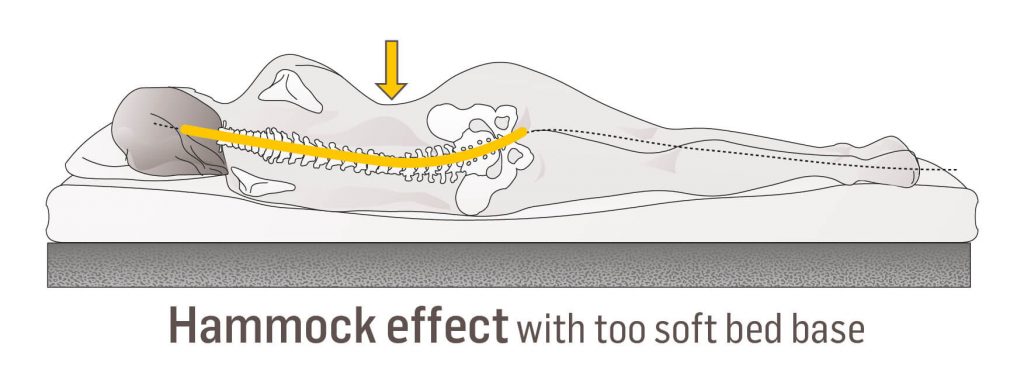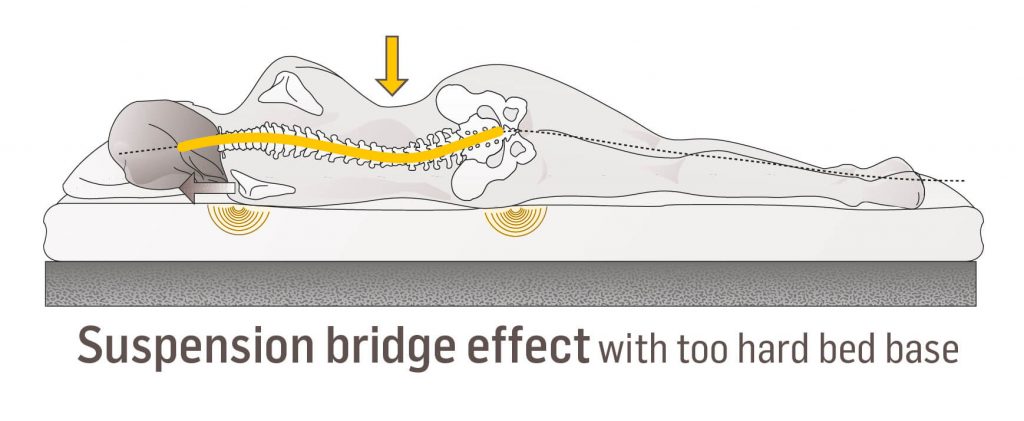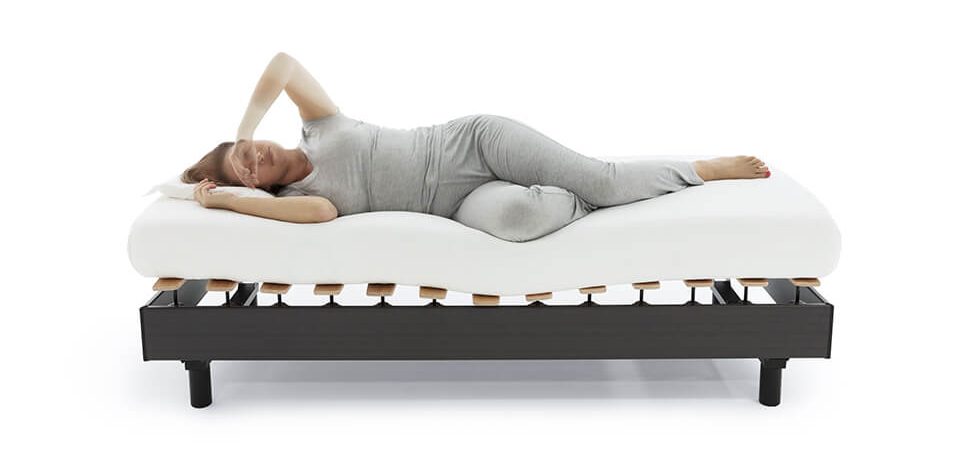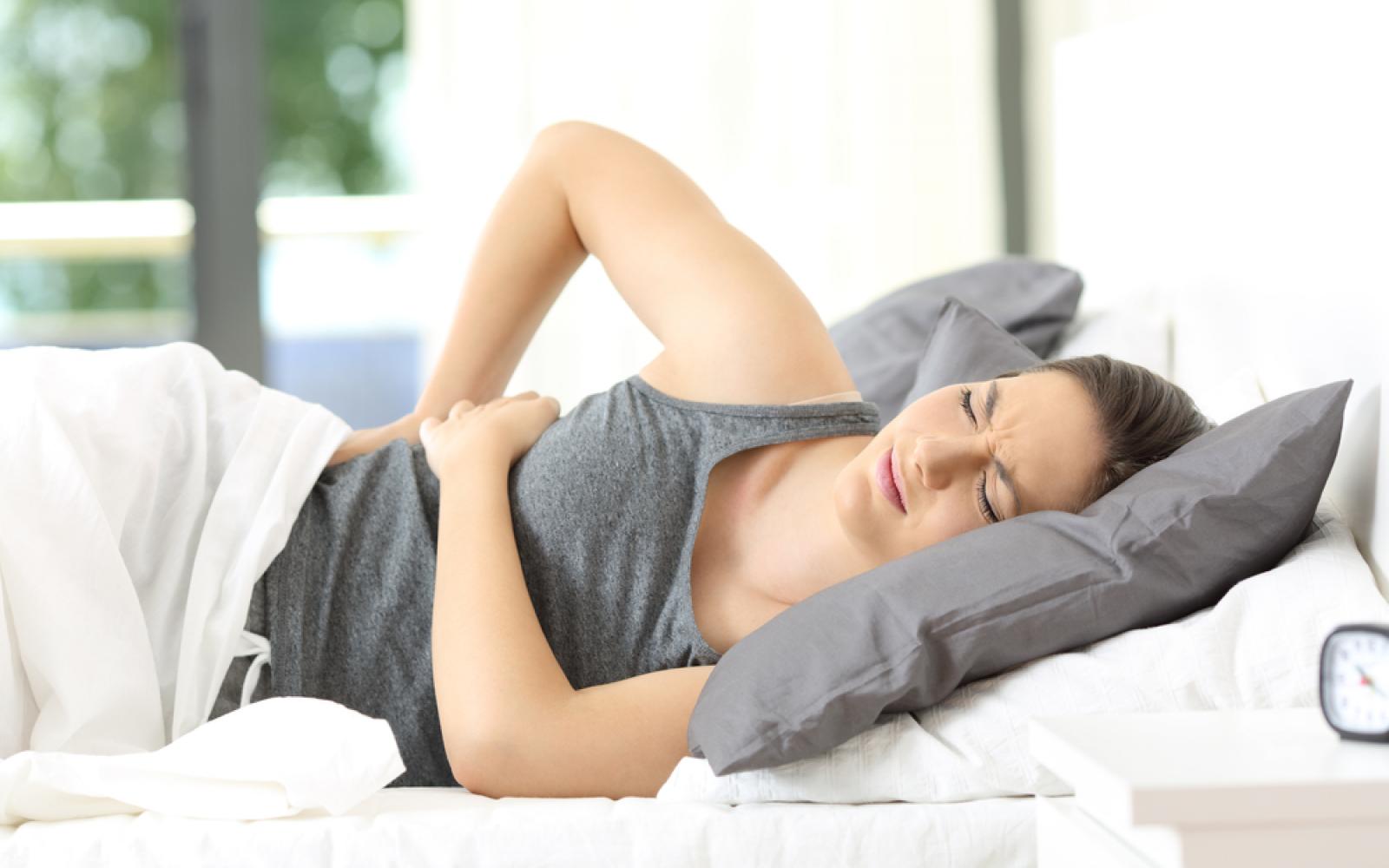Back pain at night or in the morning? Then this is for you!
Around 80% of all adults suffer or have suffered from back pain at some point in their lives. Quite a few people wake up at night or in the morning with an aching back. Often, this is caused by too much strain on the spinal column and the surrounding tissue. This can be resolved with a good bed, so that you get up in the morning feeling rested and refreshed. Without any pain in your back.
Do you suffer from back pain at night?
During the night, your body recovers from its daily activities: too much sitting, lifting heavy objects, sports, …. That is, if you have a good bed with the right mattress and a special pillow. If you sleep on a badly supporting mattress, your back and neck will not relax enough. This causes muscle tension and disrupted sleep.
An inadequate mattress means disrupted sleep. And this can cause chronic back pain.
It is important that your pelvis, spinal column and neck are supported as much as possible when you sleep. If this is not the case, you do not get enough relaxation and it can even cause damage in and around the spinal column, which may cause even more chronic back pain.
Do you suffer from back pain in the morning?
When you get out of bed in the morning, you should not have back pain or feel stiff. This is an indication of a poor night’s sleep and insufficient support of the body during sleep. It is a sign that your body and muscles are tense during sleep. This can have various reasons, but often it is due to a mattress that is too soft or firm, causing your muscles to work constantly while you are sleeping, so they cannot relax and recover sufficiently.
Hammock effect (in a mattress that is too soft)

Suspension bridge effect (in a mattress that is too hard)

Therefore, back pain when you rise or stiffness in the lower back or neck are the first signs that your mattress needs replacing or is not in line with the needs (support) of your back.
Do you not have real back problems, but always feel that you are not fully rested in the morning? It may be an indication that you do not get sufficient deep sleep. That can also be the result of inadequate support of your body by the bed base and mattress. In order to sleep well and uninterrupted, your muscles need maximum relaxation. An inadequate bed or mattress causes constant tension in your muscles.
Do you toss and turn a lot? Chances are that you wake up in the middle of the night. A bad pillow is a reason for waking up often. For a recovering night’s sleep, uninterrupted sleep is necessary. Waking often physically interferes with the recuperation of the body. Chronic interrupted sleep also has a psychological effect. Recognise the signs and replace your mattress and pillow and where necessary also your bed base on time.
Do you have back pain during the day and evening?
Do you have back pain predominantly during the day and evening? Chances are that your back muscles experience too much strain due to an incorrect (work) posture, which prevents your back muscles from properly carrying out their protective and supportive job. Therefore, it is very important to have a good posture during your daily activities, whether you’re sitting, standing or moving, to prevent a constant pressure on the intervertebral discs.
A good posture is essential for your back. It prevents constant pressure on the intervertebral discs.
Please note: going to bed with tense back muscles may also cause disrupted sleep. Try to get rid of the built-up stress before you go to sleep by taking a relaxed walk for instance. Sufficient exercise is essential.
Muscles that have not had sufficient rest because they are tense during the night, do not work as well during the day and are more likely to cause problems.
How do you recognise an inadequate bed or mattress?
How do you know that you need to change your bed or mattress? This is very easy to determine. Alarm signs of an inadequate bed or mattress are the following:
- waking up with back pain
- being tired when getting up
- back pain that deteriorates during the day
- sleeping with an aching back at night
Insufficient rest can also result in various other physical conditions, such as cardiovascular diseases and mental tiredness symptoms such as anxiety, forgetfulness and depression. We sometimes forget that sleep is a basic need. Chronic lack of sleep puts the human machine out of kilter.
Also realise that a mattress does not last a lifetime. The average proposed life of a mattress is 10 years. Is your mattress much older? Then it is a good idea to start looking for a new one. A mattress should have various segments or zones and must match your personal preferences.
Support is very important
“Support is very important”, says osteopath Koen De Doncker. “A comfortable bed that optimises the support of the body makes you sleep better. The intervertebral discs can recuperate better and recover their moisture level.”
To generate the right support during the night, with the pelvis and lower back being at right angles, it is important that the hips can drop back while at the same time the lower back is supported, preferably actively. In no case must the lower back sag.
An active and upward movement at lower back level prevents the intervertebral discs, of which L4 and L5 are the most sensitive ones, from undergoing incorrect pressure when you’re lying down. Upward pressure is necessary to counteract the impact of gravity on the lower back.
Lying on your side

Lying on your back

When using a normal mattress, it is doubtful whether the resistance in the mattress is sufficient to support the back. Moreover, the spinal column can never be at right angles with the pelvis if the mattress is just as hard at hip level as at lower back level.
Does the right sleeping position exist?
Do you sleep on your stomach, back or side? In principle there is no incorrect sleeping position. Each position has its pros and cons. Sleep and back specialists sometimes do not recommend sleeping on your stomach although there is no scientific evidence that this impacts on the quality of sleep. What we do know is that sleeping on your stomach is not the best option for your neck, as torsion develops which can be a cause of neck complaints in the long term. Therefore, try not to sleep on your stomach too much.
More than just proper sleep
If you invest in a good bed with the proper support, you experience much more benefits than just a good night’s sleep. If you sleep well, your resistance will improve too. And this helps you to be less susceptible to colds and other ailments. A Dorsoo ACTIVE+ sleep system does not only offer you a better night’s sleep, but also a better quality of life.
What is an ACTIVE+ bed?
Dorsoo is the bed specialist that guarantees an optimum night’s sleep without back pain due to its adequate and active support of the body in every sleeping position. “A Dorsoo ACTIVE+ bed gives your back maximum support. Additionally, a good pillow will give your neck and head the right support. This completes the ergonomic picture”, says manual therapist Jan Esselens.
A Dorsoo bed does not only feel lovely. It offers your intervertebral discs and the surrounding tissue the very best recuperation during the night. Your back problems will not only reduce, but you will also experience a better quality of sleep and will rise every morning refreshed and rested.

Moreover, this slatted base will continuously adjust to every changing sleeping position. This is necessary because on your side, back or stomach your body has a different profile. The contoured, hypo-allergic mattress adjusts itself smoothly. In this way, your back enjoys the right support every night again. And you get up in the morning feeling totally rested. Without the pain in your back.
Physiotherapist Stijn De Mot treats people with back and neck problems in his group practice on a daily basis. “I believe that a Dorsoo bed can have a remarkable added value for many people in their quest for a good night’s sleep.”


